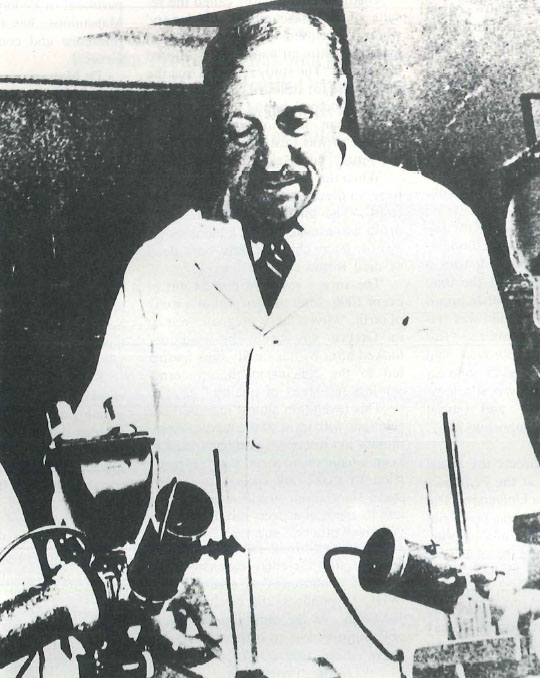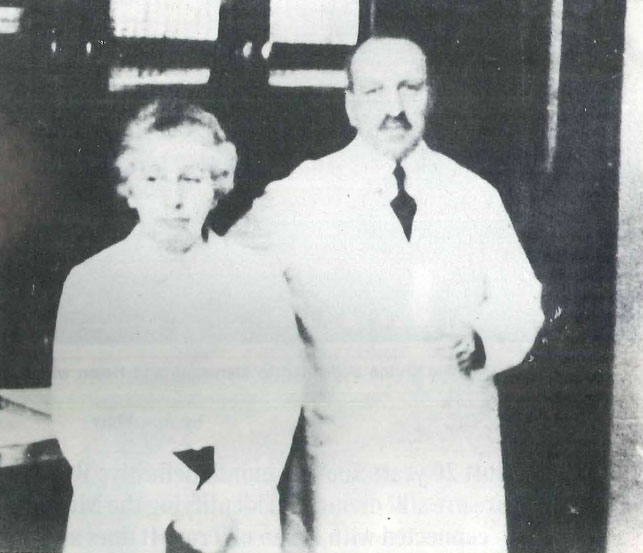Greek names are difficult to remember. Perhaps that is why Dr George Papanikolaou, who was born one hundred and ten years ago, is still relatively unknown outside medical circles.
His outstanding research in the field of cellular biology, which made medical history, was carried out quietly over four decades at Cornell University Hospital in New York. The importance of his work, his publications and his general contribution to science was later recognized. Today the unversity has a professorial chair in his name. Back in the twenties, when cervical cancer was tantamount to a death sentence, no one had thought of examining vaginal and other body secretions as an aid to cancer diagnosis. Like most innovations his original research was based on a relative ly simple fact. All types of cancer even in the earl y stages, shed non-typical cells. These ‘float’ into the secretions of the body where they mix with normal ones. Samples can therefore be taken and examined under a microscope.

The findings correspond to several classifications running from total absence of non-typical cells to the presence of those that are defin itely malignant. He also developed a staining process, still in use, which allowed the cells to be examined more effectively.
His diagnostic technique, which was widely criticized at first, represented a great advance in medical research at that time. It was quick, cheap and safe and enabled doctors to detect cancer at an early stage when it could still be successfully treated. Now it is used mainly in the battle against cancer of the cervix where secretion samples are easy to collect.
Dr Papanikolaou first expounded his theories as early as 1928. But it was not until after the Second World War that his technique was used on a wider scale. The results were dramatic. Death from cervical cancer among the women tested dropped by over 50 percent.
Foreigners, however, found it difficult to pronounce his long Greek name and used only the first three letters; so the ‘Pap’ test was born. He was now lauded in the medical world and although, perhaps unfairly, the No bel eluded him he received many distinctions including the prestigious Laker Prize. The boy from Euboea had come a long way.
He was born in Kyrni in May 1883, an attractive town of ancient lineage, which nestles among vineyards, orchards and pine trees. His family home, built of local stone with a traditional red-tiled roof, was larger than most, for his father was the only doctor in the area. With some reluctance, young George, the third child, followed in his father’s footsteps and graduated from Athens University as a medical doctor at the astonishingly young age of twenty-one. Dissatisfied with the limitations of practising medicine on Euboea, he spent much of his time discussing music – he was an accomplished violinist – poetry and philosophy with his friends.
His disappointed parents had no way of knowing that he would one day become the town’s most famous son. Eventually his father agreed to send him to Germany where he studied Nietszche and Kant as well as zoology and biology at the universities of Jena and Freiburg. For a short while he even lectured on philosophy and natural science at Munich University.
At that time the leading figure in biology was the American zoologist Thomas Morgan, a pioneer in genetic research with whom George briefly corresponded. Morgan would later win the Nobel Prize (1933) for discoveries relating to laws of heredity. Inspired by his contact with Morgan, George returned to Greece with the dream of becoming a researcher in biology only to face the reality of inadequate laboratories, few trained technicians and little general interest. Instead he changed direction, married Machi Mavroyenous and accepted a position with the famed Oceanographic Institute in Monaco: His parents believed he was settling down at last. But again, he found little fulfilment in the work and returned to his homeland to serve as an assistant surgeon in the army during the Balkan Wars. But the ideas of Thomas Morgan gave him no peace. As soon as hostilities stopped, he scraped together whatever money he could and with 250 dollars in his pocket, he and Machi set sail for America.

In the beginning they all but starved in New York and a less determined couple would have quit. In order to keep body and soul together, while he learned English and tried to gain a foothold in the American research world, they both took on a variety of jobs. He played the violin in Manhat” tan cafes and restaurants, wrote articles for the Greek-American paper Atlantis and worked at Gimbel’s department store where Machi was also employed sewing on buttons. On one awful day they were reduced to selling their rugs on the street.
Eventually, however, after months of hand-to-mouth existence, Dr Morgan , then a professor at Columbia University recognized his protege’s unusual intelligence and found Papanikolaou a position in the Pathological and Anatomical Department of the teaching hospital attached to Cornell University. At last he had taken the first step towards fulfilling his dream.
A workaholic and a truly dedicated scientist, he seldom took a day off during the 44 years he worked there, and no one remembers him taking a holiday apart from one trip home to Greece. Even when he became a respected and renowned scientific figure he remained hard-working, self-effacing and approachable, always more than willing to help his younger compatriots through any initial difficulties. One of these was the Athenian George Kotzias, doctor and scientist, who later won fame when he spearheaded the research team which discovered ‘El Dopa’ used to treat Parkinson’s disease.
The statues of both these Greek doctors stand today in Cornell University. To Dr Pap, the thought of retirement was abhorrent. And at the age of 78 he became head of the cancer institute in Miami which bears his name. Sadly, he was only able to enjoy the Florida sunshine for a few months. In the early spring of 1962 he died suddenly of angina. His research was broad and profound, the Pap test only a small part of it.
However, this technique has never been bettered and has now become universal. In many countries women over thirty have the benefit of government-sponsored annual tests, free of charge. In the country of his birth, too, the test is also available in most large hospitals in Athens, Thessaloniki, Patras and Ioannina. There are countless women of every nationality who enjoy life today because of Dr Papanikolaou’s dedicated research and that, in the end, was perhaps the only reward the good, if anonymous, doctor ever sought.







